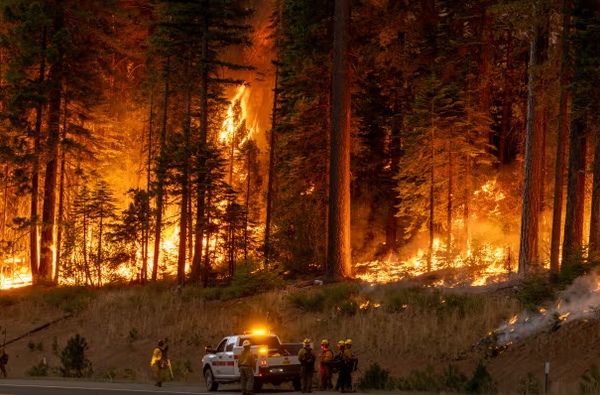Brussels is preparing to pressure emerging economies such as China to commit funds to fight climate change in developing countries at global talks in November, according to a document seen by POLITICO.
Funding is at the centre of this year’s UN climate conference, known as COP29. Developing countries are demanding a significant increase in funding to help them cut emissions and prepare for the effects of global warming.
The current funding commitment of $100bn a year, which runs until 2025 and is to be replaced by a new target at COP29, is funded by countries classified as industrialised when the UN climate treaty was drawn up in 1992.
The EU is the biggest payer and intends to continue funding it, but wants countries that have become richer over the past three decades to make a significant contribution as well, according to the bloc’s draft position on COP29, obtained by POLITICO.
In the document, dated July 26, the EU calls for a broadening of the “contributor base” to reflect the “evolution of relevant capabilities” since the 1990s. The draft document reads:
“Such broadening of contributions provides an opportunity to increase the finance to support the most vulnerable countries and communities and reflects strong global solidarity towards them. In this context [the EU] CALLS on all countries according to their financial capabilities, including emerging economies, to contribute to the new goal.”
The statement does not mention a specific country, but European diplomats and officials are trying to persuade Beijing to contribute to the funding, given that China has become not only the world’s second-largest economy but also the main emitter of greenhouse gases warming the planet.
The influence of China
Last week, senior German climate negotiator Jochen Flasbarth told POLITICO that rich countries will only increase funding if China starts paying.
The draft position also suggests that the EU could insist on limiting the list of possible beneficiaries or directing more money to countries that are particularly vulnerable to global warming, rather than allowing all countries classified as developing to access the same level of funding.
The bloc “emphasises the importance” of setting a new funding target “taking into account the needs and priorities of the most vulnerable countries,” such as island states and members of the group known as least developed countries. An earlier draft referred to “the needs and priorities of developing countries,” the document shows.
The spat mirrors a dispute last year over whether China would donate to a fund to support affected communities. China rejected demands from the US, EU and its allies despite the UAE breaking the rules and becoming the first country outside the traditional donor group to provide climate finance through an official UN fund.
That fund has raised about $655 million. The November standoff raises the financial stakes many times over – some developing countries have set a $1 trillion-a-year target as a starting point for negotiations – and is seen by European diplomats as a moment for a fundamental break with what they see as an outdated distinction between rich and poor.
Middle East must also contribute, EU says
China is not the only one seen as able to contribute. Wealthy Gulf states that are themselves doing huge damage to the climate by selling their fossil fuel reserves, such as Qatar, the UAE and Saudi Arabia, are likely to be pressured to do their part. Pressure is likely to be put on Singapore as well.
The draft EU document also suggests that the bulk of the new target cannot come from national budgets, emphasising that “private investment will have to take on most of the necessary investments in low-emission, resource-efficient and climate-resilient development.”
The draft position, which was discussed by EU member state officials on Tuesday, could still undergo changes before the summit in Azerbaijan on November 11. Officials will try to finalise the text in September before submitting it to ministers for consideration.
EU finance ministers are expected to agree the financial element of the position at a meeting on October 8, and the final COP29 position is expected to be signed by the bloc’s environment ministers on October 14.
